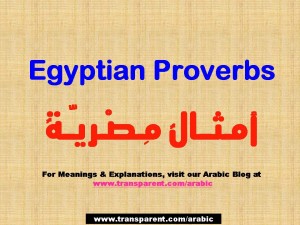Egyptian Proverbs (7) Posted by Fisal on Feb 10, 2013 in Arabic Language, Culture, Grammar, Pronunciation, Vocabulary
Arabic proverbs الأمــثـــال الــعــربــيــــة reflect the beauty جــمـــال of the Arabic Language and the wisdom حــكــمــة of the Arabs الــعــرب and their culture الــثــقـــافـــة . In Egypt, these proverbs are part of everyone’s daily routine. There is no one single situation مــوقــف that would not have the perfect proverb tailored for it. Just for the sake of fun مــرح , I am going to share some of these famous proverbs. If you are living in Egypt, you will probably recognize them right away, but if you live outside Egypt, most likely you will have a smile ابــتــســـامــــة on your face. These proverbs are in the Egyptian dialect الـلــهــجـــة الــمــصــريـــة .
الــغـــزَّالـــَـــة الـشــاطــرة تــِــغـــزل بــرجـــْـــل حـــمــــار
/ El-ghaz’zalah el-shatra tegh’zil bi’rigl humar /
Literal Translation: The skillful spinster spins with the leg of a donkey.
Hidden meaning: A skillful worker can do good work even with inadequate tools.
Applicability: Criticizing lazy and incompetent workers who blame their tools for the poor job they do.
تـــَـــمــَـــخــَّـــضَ الــجـــَـــمـــَـــلُ و وَلــَـــدَ فـــأراً
/ Tama’khada al-gamalu wa wala’da fa’run /
Literal translation: The camel went through labor only to give birth to a mouse
Hidden meaning: Looks are deceiving
Applicability: To express disappointment when something big is expected but never materializes.
نــقـــولـــوا طـــُــور يــقــولــُــوا اِحــْـــلــبـــُـــوه
/ No’ollo toor, yo’olo ihlibooh /
Literal translation: We tell them it is a bull, they say milk it
Meaning: They are trying to get more than they can.
Applicability: To criticize those who insist on getting what is not available.
لـــَـــبــِّـــسْ الـــخــُــنــْــفــِــســَــة تــبــقـــى ســِــتْ الــنــِّـــســَـــا
/ Lab’bis el-khonfisa tib’a sitt in-nisa /
Literal translation: Dress-up the beetle; it becomes the Lady of all Ladies
Hidden Meaning: Make up (cosmetics) can make the ugly quite pretty.
Applicability: Don’t be fooled by appearances.
يـــمــُـــوت الـــزَّمــَّـــار و صــُــبــَـــاعــُـــه بــيــلــعــَـــبْ
/ Yimoot el-zam’mar we soba’oh bi’yil’ab /
Literal translation: The trumpet player dies, and his finger is still playing
Hidden meaning: Habits stick to the person all his life
Applicability: Criticizing somebody for his/her bad habits.
الــزَّن عــلـى الــودان أمــَّــر مـِـن الــســِّــحــْـــر
/ Ez’zann ala el-widaan amarr min is’sihr /
Literal translation: Humming in one’s ear is worse than magic
Hidden meaning: Incessant meaningless complaints do eventually work!
Applicability: Advice to avoid listening to somebody who keeps on pushing a foolish argument.
الــغـــَـــايــبْ حــِــجــّـــتــــُـــه مــعــاه
/ El-gha’yib higgituh ma’aah /
Literal translation: An absent person has his excuse.
Hidden Meaning: Don’t jump to conclusions.
Applicability: Don’t blame an absent person until you hear his/her side of the story.
الــلــِّــى فــَــات مــَـــات
/ El’li faat maat /
Literal translation: What is past is dead
Hidden Meaning: Forget the past; open a new page
Applicability: An advice to a person who has undergone a bad experience.
الــصــَّـــبـــْـــر مــُـــفـــْـــتـــَـــاح الـــفــَـــرَج
/ El-sabr moftah il-farag /
Literal translation: Patience is the key to release
Hidden Meaning: Be patient
Applicability: An advice to a person with a lot of problem.
الــعــَــبــْــد فــى الـــتـــَّـــفـــكـــيـــر و الـــرَّبْ فــى الــتـــَّـــدبـــيــــر
/ El-‘abd fil-tafkeer wil-ra’b fil-tadbeer /
Literal translation: Man thinks and God takes care of things.
Hidden Meaning: Man proposes, God disposes.
Applicability: Do what you can and leave the rest for God to take care of.
*****
Egyptian Proverbs (1) Egyptian Proverbs (2)
Egyptian Proverbs (3) Egyptian Proverbs (4)
Egyptian Proverbs (5) Egyptian Proverbs (6)
*****
Check us back soon
Peace ســـلام /Salam/

Build vocabulary, practice pronunciation, and more with Transparent Language Online. Available anytime, anywhere, on any device.
About the Author: Fisal
Well, I was born near the city of Rasheed or Rosetta, Egypt. Yes, the city where the Rosetta Stone was discovered. It is a small city on the north of Egypt where the Nile meets the Mediterranean. I am a Teacher of EFL.




